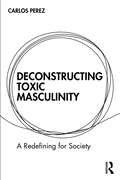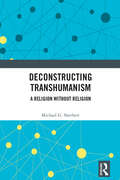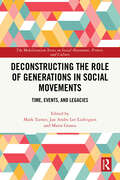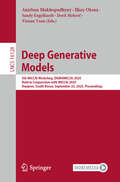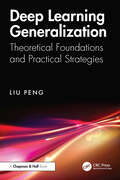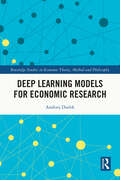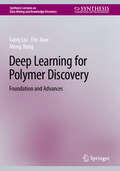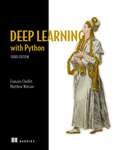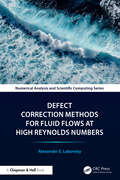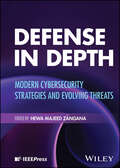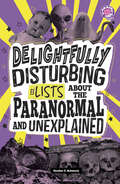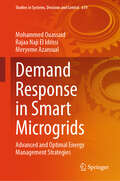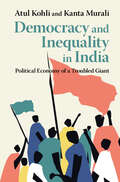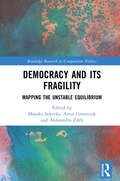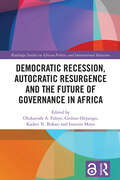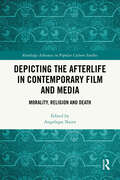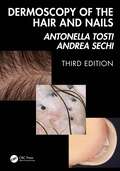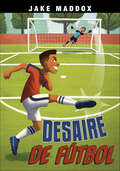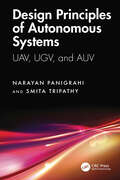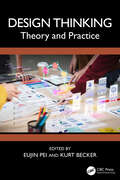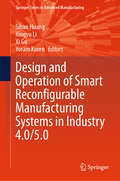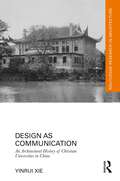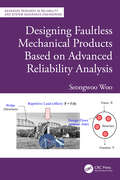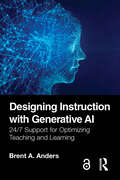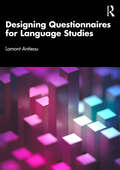- Table View
- List View
Deconstructing Toxic Masculinity: A Redefining for Society
by Carlos PerezThis accessible book explores toxic masculinity, looking at how to define it, and how we can and should challenge its spread. This book draws on Derrida’s deconstruction, using the philosophical lens to deconstruct what toxic masculinity means and to better understand its significance for our society. It focuses on how harmful aspects of masculinity spread, infiltrate, and intoxicate our societies and how existing structures allow aspects of harmful masculinity to become toxic. This book also features discussions and analysis of participants’ lived experiences of masculinities, alongside the author’s reflections. It explores the relevance of toxic masculinity in work environments, politics, relationships, and gender roles and seeks to challenge and mitigate its damages for everyone. Encouraging critical thinking and understanding of healthier ways of being for all, this timely book will be of interest to therapists, counselors, teachers, and practitioners of family studies. It will also be useful reading for students in the fields of psychology, gender studies, sociology, and related fields.
Deconstructing Transhumanism: A Religion Without Religion
by Michael G. SherbertDeconstructing Transhumanism: A Religion Without Religion challenges the widely held view that transhumanism—a movement advocating for the enhancement of human life through technology—is purely secular and scientific. Instead, this groundbreaking study reveals how transhumanist thought remains deeply shaped by religious ideas, particularly those rooted in Christianity. Drawing on the philosophy of Jacques Derrida, Michael G. Sherbert explores how religious concepts like the sacred, messianism, salvation, and transcendence quietly persist within transhumanist visions of the future—often without reflection on the potential dangers they carry.From artificial intelligence to the dream of digital immortality, this book uncovers how technological aspirations often mirror age-old religious hopes. Through a careful analysis of leading figures such as Ray Kurzweil, David Pearce, and Nick Bostrom, Sherbert shows that even the most futuristic goals often retain hidden religious structures—what Derrida calls a “religion without religion.”Spanning philosophical inquiry, ethical reflection, and cultural critique, Deconstructing Transhumanism invites readers to rethink the assumptions behind some of today’s most influential ideas about technology, progress, and the future. It offers a timely examination of the religious undercurrents shaping Western technological imaginaries—urging greater awareness of the powerful, and sometimes perilous, narratives we carry into our increasingly high-tech future.
Deconstructing the Role of Generations in Social Movements: Time, Events, and Legacies (The Mobilization Series on Social Movements, Protest, and Culture)
by Maria Grasso Mark Turner Jan Andre Lee LudvigsenAlthough questions of how a social group’s shared experiences growing up in particular historical and social contexts shapes their identities, including their political identities, have engaged sociologists of family, youth, citizenship, culture, and political change, few books have so far examined the specific role of generations and generational consciousness in social movement activism. As such, this is the first book to focus exclusively on issues of temporality, events, and generational legacies in social movements. In demonstrating how generational consciousness, and specific frames, narratives, and repertoires of contention are shaped by, and respond to, historical and contemporary meanings of major events and social transformations in different locations, new important questions on race, class, ethnicity, gender, sexuality, and citizenship are revealed at new, emerging critical junctures in the twenty-first century,With its high-quality chapters and transnational scope, this book will capture several key trends in the role of generations in social movements and explores topics including contemporary feminism, family, and intergenerational transmission, generationality and political change, rituals and social change, and Black politics and US democracy.This is an invaluable resource for students and academics with an interest in sociology, political science, and the study of social movements and social change, and for policymakers and readers with a general interest in intergenerational conflict and the challenges of engaging new youth generations in political and democratic structures and processes.
Deep Generative Models: 5th MICCAI Workshop, DGM4MICCAI 2025, Held in Conjunction with MICCAI 2025, Daejeon, South Korea, September 23, 2025, Proceedings (Lecture Notes in Computer Science #16128)
by Anirban Mukhopadhyay Sandy Engelhardt Ilkay Oksuz Yixuan Yuan Dorit MehrofThis book constitutes the proceedings of the 5th Workshop on Deep Generative Models for Medical Image Computing and Computer Assisted Intervention, DGM4MICCAI 2025, held in conjunction with the 28th International Conference on Medical Image Computing and Computer Assisted Intervention, MICCAI 2025, in Daejeon, South Korea, during September 2025.The 33 papers presented in this book were carefully reviewed and selected from 50 submissions. These papers deal with recent algorithmic developments, new results, and promising future directions in Deep Generative Models.
Deep Learning Generalization: Theoretical Foundations and Practical Strategies
by Liu PengThis book provides a comprehensive exploration of generalization in deep learning, focusing on both theoretical foundations and practical strategies. It delves deeply into how machine learning models, particularly deep neural networks, achieve robust performance on unseen data. Key topics include balancing model complexity, addressing overfitting and underfitting, and understanding modern phenomena such as the double descent curve and implicit regularization.The book offers a holistic perspective by addressing the four critical components of model training: data, model architecture, objective functions, and optimization processes. It combines mathematical rigor with hands-on guidance, introducing practical implementation techniques using PyTorch to bridge the gap between theory and real-world applications. For instance, the book highlights how regularized deep learning models not only achieve better predictive performance but also assume a more compact and efficient parameter space. Structured to accommodate a progressive learning curve, the content spans foundational concepts like statistical learning theory to advanced topics like Neural Tangent Kernels and overparameterization paradoxes.By synthesizing classical and modern views of generalization, the book equips readers to develop a nuanced understanding of key concepts while mastering practical applications.For academics, the book serves as a definitive resource to solidify theoretical knowledge and explore cutting-edge research directions. For industry professionals, it provides actionable insights to enhance model performance systematically. Whether you're a beginner seeking foundational understanding or a practitioner exploring advanced methodologies, this book offers an indispensable guide to achieving robust generalization in deep learning.
Deep Learning Models for Economic Research (Routledge Studies in Economic Theory, Method and Philosophy)
by Andrzej DudekIn today’s data-driven world, the ability to make sense of complex, high-dimensional datasets is crucial for economists and data scientists. Traditional quantitative methods, while powerful, often struggle to keep up with the complexities of modern economic challenges. This book bridges this gap, integrating cutting-edge machine learning techniques with established economic analysis to provide new, more accurate insights.The book offers a comprehensive approach to understanding and applying neural networks and deep learning models in the context of conducting economic research. It starts by laying the groundwork with essential quantitative methods such as cluster analysis, regression, and factor analysis, then demonstrates how these can be enhanced with deep learning techniques like recurrent neural networks (RNNs), convolutional neural networks (CNNs), and transformers. By guiding readers through real-world examples, complete with Python code and access to datasets, it showcases the practical benefits of neural networks in solving complex economic problems, such as fraud detection, sentiment analysis, stock price forecasting, and inflation factor analysis. Importantly, the book also addresses critical concerns about the “black box” nature of deep learning, offering interpretability techniques like Local Interpretable Model-agnostic Explanations (LIME) and SHapley Additive exPlanations (SHAP) to demystify model predictions.The book is essential reading for economists, data scientists, and professionals looking to deepen their understanding of AI’s role in economic modeling. It is also an accessible resource for non-experts interested in how machine learning is transforming economic analysis.
Deep Learning for Polymer Discovery: Foundation and Advances (Synthesis Lectures on Data Mining and Knowledge Discovery)
by Gang Liu Meng Jiang Eric InaeThis book presents a comprehensive range of topics in deep learning for polymer discovery, from fundamental concepts to advanced methodologies. These topics are crucial as they address critical challenges in polymer science and engineering. With a growing demand for new materials with specific properties, traditional experimental methods for polymer discovery are becoming increasingly time-consuming and costly. Deep learning offers a promising solution by enabling rapid screening of potential polymers and accelerating the design process. The authors begin with essential knowledge on polymer data representations and neural network architectures, then progress to deep learning frameworks for property prediction and inverse polymer design. The book then explores both sequence-based and graph-based approaches, covering various neural network types including LSTMs, GRUs, GCNs, and GINs. Advanced topics include interpretable graph deep learning with environment-based augmentation, semi-supervised techniques for addressing label imbalance, and data-centric transfer learning using diffusion models. The book aims to solve key problems in polymer discovery, including accurate property prediction, efficient design of polymers with desired characteristics, model interpretability, handling imbalanced and limited labeled data, and leveraging unlabeled data to improve prediction accuracy.
Deep Learning with Python, Third Edition
by Matthew Watson Francois CholletThe bestselling book on Python deep learning, now covering generative AI, Keras 3, PyTorch, and JAX!Deep Learning with Python, Third Edition puts the power of deep learning in your hands. This new edition includes the latest Keras and TensorFlow features, generative AI models, and added coverage of PyTorch and JAX. Learn directly from the creator of Keras and step confidently into the world of deep learning with Python. In Deep Learning with Python, Third Edition you&’ll discover: • Deep learning from first principles • The latest features of Keras 3 • A primer on JAX, PyTorch, and TensorFlow • Image classification and image segmentation • Time series forecasting • Large Language models • Text classification and machine translation • Text and image generation—build your own GPT and diffusion models! • Scaling and tuning models With over 100,000 copies sold, Deep Learning with Python makes it possible for developers, data scientists, and machine learning enthusiasts to put deep learning into action. In this expanded and updated third edition, Keras creator François Chollet offers insights for both novice and experienced machine learning practitioners. You'll master state-of-the-art deep learning tools and techniques, from the latest features of Keras 3 to building AI models that can generate text and images. About the technology In less than a decade, deep learning has changed the world—twice. First, Python-based libraries like Keras, TensorFlow, and PyTorch elevated neural networks from lab experiments to high-performance production systems deployed at scale. And now, through Large Language Models and other generative AI tools, deep learning is again transforming business and society. In this new edition, Keras creator François Chollet invites you into this amazing subject in the fluid, mentoring style of a true insider. About the book Deep Learning with Python, Third Edition makes the concepts behind deep learning and generative AI understandable and approachable. This complete rewrite of the bestselling original includes fresh chapters on transformers, building your own GPT-like LLM, and generating images with diffusion models. Each chapter introduces practical projects and code examples that build your understanding of deep learning, layer by layer. What's inside • Hands-on, code-first learning • Comprehensive, from basics to generative AI • Intuitive and easy math explanations • Examples in Keras, PyTorch, JAX, and TensorFlow About the reader For readers with intermediate Python skills. No previous experience with machine learning or linear algebra required. About the author François Chollet is the co-founder of Ndea and the creator of Keras. Matthew Watson is a software engineer at Google working on Gemini and a core maintainer of Keras. Table of Contents 1 What is deep learning? 2 The mathematical building blocks of neural networks 3 Introduction to TensorFlow, PyTorch, JAX, and Keras 4 Classification and regression 5 Fundamentals of machine learning 6 The universal workflow of machine learning 7 A deep dive on Keras 8 Image classification 9 ConvNet architecture patterns 10 Interpreting what ConvNets learn 11 Image segmentation 12 Object detection 13 Timeseries forecasting 14 Text classification 15 Language models and the Transformer 16 Text generation 17 Image generation 18 Best practices for the real world 19 The future of AI 20 Conclusions
Defect Correction Methods for Fluid Flows at High Reynolds Numbers (Chapman & Hall/CRC Numerical Analysis and Scientific Computing Series)
by Alexander E. LabovskyDefect Correction Methods for Fluid Flows at High Reynold’s Numbers presents the mathematical development of defect correction methods (DCM) in application to fluid flow problems in various settings. We will show several approaches to applying the DCM ideas in computational fluid dynamics (CFD) – from a basic idea of controlling the flow by the means of increased diffusion, to the state-of-the-art family of novel, DCM-based turbulence models. The main idea of the methods presented in this book, is to use defect correction in turbulence modelling; additionally, several methods will also be presented, that aim at reducing the time discretization error.Features · Provides a road map, starting from the ideas of minimally invasive controlling of turbulent flows, to the ways of improving the existing regularization techniques with DCM, to the ideas of ‘full defect correction’ in both space and time and, finally, to the more complex embedding of the DCM into turbulence modelling by the ‘correction’ of the whole turbulence model· Can be used for teaching a topics course on a Masters or Ph.D. level. It is even more suitable as a reference for CFD theorists and practitioners, with most of the methods being minimally invasive and, therefore, easy to implement in the existing/legacy codes· Discusses the current challenges in turbulence modelling with defect correction, showing several possible directions for future developments. Two source codes are provided – one for a regularization technique and another for a novel turbulence model – in order to give an interested researcher a quick start to the topic of DCM in CFD.
Defense in Depth: Modern Cybersecurity Strategies and Evolving Threats
by Hewa Majeed ZanganaUp-to-date reference on the evolving landscape of cybersecurity, focusing on strategies that integrate AI, blockchain, and human factors Defense in Depth delivers a comprehensive guide to the rapidly developing field of digital threats and defenses. This book examines how defense-in-depth approaches integrate multiple layers of security to protect against a wide range of threats; how AI technologies are being utilized for threat detection, response, and prediction; and how blockchain technology can be leveraged to enhance security measures, particularly in ensuring data integrity and securing transactions. Case studies of significant cyberattacks are included throughout the text to elucidate key concepts. The book discusses additional topics such as: The critical importance of cybersecurity in today’s interconnected world and the historical evolution of cyber threats, highlighting modern attack vectorsCore principles of defense, detailing layered security measures across networks, applications, data, and endpointsHuman factors, often the weakest link in cybersecurity, with strategies for mitigating risksMachine learning and neural networks and their usage in AI-driven security solutions across finance, healthcare, and governmentAdvanced defense techniques, practical applications, and future directions in cybersecurity Defense in Depth is an essential reference on the state of the art in the field for cybersecurity professionals, IT practitioners, and researchers. It is also an excellent learning aid for advanced students in cybersecurity, particularly those in graduate programs.
Delightfully Disturbing Lists About the Paranormal and Unexplained
by Heather E. SchwartzSpooky season can be all year long when the scariest, most spine-tingling facts are collected in this book of delightfully disturbing lists. Chapters make the content event more digestible. Full-color images and inviting designs will engage readers’ minds and get them excited to learn more.
Demand Response in Smart Microgrids: Advanced and Optimal Energy Management Strategies (Studies in Systems, Decision and Control #619)
by Mohammed Ouassaid Rajaa Naji El Idrissi Meryeme AzaroualThis book covers the optimization of the energy flow management of a grid-tied photovoltaic-wind-battery energy storage system and the development of demand response algorithms for a single customer at the lowest level and extended it to a large community of participants at the highest level. Hence, this book consists of two parts. The first part is devoted to the design of energy management strategies for a residential PV-WT system, while considering time of use and feed in tariff schemes. Further, the developed management algorithms mitigate the greenhouse gas emissions. Additionally, a closed-loop control based-model predictive control scheme, to forecast the system behavior and deal with renewable energy resources and load disturbances, is elaborated. The second part is dedicated to developing effective demand side management techniques and cooperative energy scheduling in the framework of collective smart-buildings. Cooperative energy scheduling programs are designed while considering three objectives: minimizing peak load, minimizing electricity cost, and avoiding the occurrence of rebound peaks. Optimal consumption decisions are examined in residential, commercial, and industrial areas. Besides, the impact of electric vehicle charging methods is investigated for different EV penetration levels. Also, a game theory approach for energy consumption scheduling of a community of smart microgrids is built. In summary, this book successfully establishes the important synergy between microgrid energy management and demand response at the level of a smart home and an aggregated building community. The above aspects are illustrated in this book in 12 chapters. The scope is broad. This book chapters are very effective in theoretical analysis and design of optimization algorithms in the realm of smart grids. This book is intended to provide advanced undergraduate, graduate students, engineers, researchers on energy management within smart homes and clustered buildings, with a comprehensive understanding of various methods and designed algorithms. These strategies and algorithms aim to deal with defies ranging from augmented adoption of microgrids to the introduction of demand response approaches, to enhance the grid viability and resilience.
Democracy and Inequality in India: Political Economy of a Troubled Giant
by Atul Kohli Kanta MuraliContemporary India provides a giant and complex panorama that deserves to be understood. Through in-depth analysis of democracy, economic growth and distribution, caste, labour, gender, and foreign policy, Atul Kohli and Kanta Murali provide a framework for understanding recent political and economic developments. They make three key arguments. Firstly, that India's well-established democracy is currently under considerable strain. Secondly, that the roots of this decline can be attributed to the growing inequalities accompanying growth since the 1990s. Growing inequalities led to the decline of the Congress party and the rise of the BJP under Narendra Modi. In turn, the BJP and its Hindu-nationalist affiliates have used state power to undermine democracy and to target Indian Muslims. Finally, they highlight how various social groups reacted to macro-level changes, although the results of their activism have not always been substantial. Essential reading for anyone wishing to understand democracy in India today.
Democracy and Its Fragility: Mapping the Unstable Equilibrium (Routledge Research in Comparative Politics)
by Artur Gruszczak Monika Sawicka Aleksandra ZdebThis book explores democratic fragility, an underdeveloped concept in the analyses of contemporary political regimes. Diagnoses of fragility commonly occur when states are brought to the brink of the abyss. Democracy and Its Fragility: Mapping the Unstable Equilibrium builds on the premise that fragility is an inherent trait of democracy that expresses its exposure to disintegration yet does not foretell its death.Employing a novel conceptual lens that seeks to scrutinize the stability of contemporary democratic regimes across the world, the book offers a twofold contribution that provides new leverage for analysis. Theoretically, it refines the notion of fragility, making it a complementary variable to the latest research on robustness and resilience. Empirically, the volume engages with an overview of fragility indicators featured in indices mapping the quality of democracy and an assessment of their limitations. What follows are in-depth qualitative case studies zooming into the struggles for democratic regime maintenance and response to a variety of unfavourable conditions in 13 countries across Asia, Africa, the Middle East, Southern Europe and the Americas.Addressing issues that are both conceptually advanced and highly accessible, Democracy and Its Fragility: Mapping the Unstable Equilibrium will attract academics and students of democracy studies, politics and government, and comparative politics.
Democratic Recession, Autocratic Resurgence and The Future of Governance in Africa (Routledge Studies in African Politics and International Relations)
by Inocent Moyo Gedion Onyango Olukayode A. Faleye Kaderi N. BukariThis book re-examines and contextualises political developments that have seen African countries make progress in achieving democratic governance over the last two decades alongside their struggle to institutionalise it amidst socioeconomic and political complexities.It provides a comprehensive discussion on emerging or 'aborted democratisation' and its social consequences, as contributors analyse the environmental, security, socioeconomic, and political impacts of political transitions, whether democratic or otherwise, on the continent. The book explores the potential causes of democratic regression and the consolidating authoritarianism in regions where democratic progress appeared promising and their actual implications for African governance. Finally, it provides practical recommendations for sustainable policy changes to ensure democratic survival.This book will be of key interest to scholars and students of African politics and studies, democracy and democratisation, autocratisation studies, development and area studies, human rights, governance, human security, and more broadly to political science, African history, international relations, and the wider social sciences.
Depicting the Afterlife in Contemporary Film and Media: Morality, Religion and Death (Routledge Advances in Popular Culture Studies)
by Angelique NairnWhat lies beyond death? This book brings together a diverse collection of scholarly voices to explore how popular culture imagines—and reimagines—the afterlife. Drawing from film, television, video games, literature, advertising, and digital technologies, this book examines how narratives about Heaven and Hell, ghosts and gods, memory and immortality shape contemporary understandings of morality, death, and what may come after.From Pixar’s Coco to The Good Place, Ghostbusters, Upload, and Westworld, these chapters interrogate the enduring power of afterlife narratives to provide existential comfort, moral guidance, and cultural critique. Whether through the lens of theology, philosophy, or secular imagination, contributors consider how popular media blurs the sacred and the profane, challenging dogma, reframing ethics, and offering new possibilities for how we remember the dead and live among the living.Spanning topics such as queer love in the afterlife, Indigenous cosmologies, digital resurrection, and the theological implications of robots, Depicting the Afterlife in Contemporary Film and Media: Morality, Religion and Death is a timely exploration of how the afterlife continues to haunt and inspire modern culture.Essential reading for scholars of media studies, religious studies, cultural theory, and anyone fascinated by humanity’s oldest and most enduring question: what happens when we die?
Dermoscopy of the Hair and Nails 3e
by Antonella Tosti Andrea SechiThis new edition of a bestselling text almost amounts to a completely new book, with over 750 figures of common and uncommon disorders, including new chapters on trichoscopy of hair transplantation, teletrichoscopy, and trichoscopy of the shaved scalp. The chapters also list the key clues that are important to help the practitioner reach the correct diagnosis about problems with hair or nails."Numerous high-quality photos are helpful in demonstrating key features" (Doody’s Reviews) [of the previous edition]
Desaire de fútbol
by Jake MaddoxDespués de trabajar duro en la temporada baja, Quincy está emocionado de ascender a un equipo de fútbol de primer nivel y jugar con su amigo Will. Pero el resto de sus nuevos compañeros de equipo en los Vipers no están tan entusiasmados. Le dan la espalda a Quincy, lo que le dificulta encontrar su ritmo. Pero pronto, Quincy comienza a ganarse algo de respeto. Entonces su entrenador lo cambia a la alineación titular y mueve a Will al banco. ¿Podrá Quincy encontrar una manera de que Will vuelva al juego? ¿O su amistad flaqueará por el repentino desaire futbolístico? ¡Descúbrelo en este emocionante libro de capítulos fácil de leer de Jake Maddox! After working hard in the off-season, Quincy is thrilled to move up to a top-level soccer team and play with his friend Will. But the rest of his new teammates on the Vipers aren&’t so excited. They give Quincy the cold shoulder, making it difficult for him to find his groove. But soon, Quincy begins to earn some respect. Then his coach shifts him into the starting lineup—and moves Will to the bench. Can Quincy find a way to get Will back in the game? Or will their friendship falter over the sudden soccer snub? Find out in this exciting, easy-to-read chapter book by Jake Maddox!
Design Principles of Autonomous Systems: UAV, UGV, and AUV
by Narayan Panigrahi Smita TripathyThis book explains unmanned systems including Unmanned Aerial Vehicles (UAVs), Autonomous Underwater Vehicles (AUVs) and Unmanned Ground Vehicles (UGVs). It also details system and subsystem compositions and their basic design. The components/subcomponents, employed payloads and sensors, and communication systems used to compose the autonomous system are discussed. It examines generic applications of these unmanned systems including specific missions for which they are employed. Other topics like swarm of drone, anti-drone system, and some algorithms used in navigation and communication of the drone are also discussed.Some key features: Helps readers understand nuances of autonomous systems on land, in air, and in sea. Explains pertinent design principles, sensors, and communication system. Lays the foundation for crafting, designing, and deploying autonomous systems for different applications. Reviews algorithms, computing, control and technology stacks required for design of UAS. Discusses software and navigation aspects of autonomous systems with the concepts of SLAM. This book is aimed at graduate students and researchers in mechatronics engineering, systems and sensors, systems and control, and aerospace engineering.
Design Thinking: Theory and Practice
by Kurt Becker Eujin PeiThis book aims to provide readers with an in-depth understanding of design thinking by documenting the personal insights of professionals and practitioners from a wide range of disciplines. Design Thinking: Theory and Practice refers to a series of cognitive, strategic, and practical steps used during the process of designing, and the context of how people reason when they engage with solving problems. The scope of this book focuses on topics such as problem-solving, systems thinking, innovation, and the role of design in product design and services. This book is unique as it brings together "stories" from both academics’ and practitioners’ perspectives, enabling readers to view design thinking from many different perspectives that can be applied in every-day life situations or for organizations when developing plans and policies. This book would be essential reading for design engineers, industrial designers, and mechanical engineers who have interest in design thinking.
Design and Operation of Smart Reconfigurable Manufacturing Systems in Industry 4.0/5.0 (Springer Series in Advanced Manufacturing)
by Yoram Koren Sihan Huang Xingyu Li Xi GuThis book presents the evolution roadmap of Reconfigurable Manufacturing Systems (RMS) and their characteristics since its invention in the 1990s. It discusses the role of RMS in today&’s increasingly competitive manufacturing environment and unpredictable markets and the new challenges and opportunities in RMS design and operations in the emerging Industry 4.0/5.0 era. In addition, this book investigates the relationship between reconfigurable manufacturing and smart manufacturing and demonstrates how smart manufacturing techniques can facilitate the design and operations of RMSs. With state-of-the-art research on the development of novel methodologies based on smart manufacturing to guide the design and operations of reconfigurable machines and manufacturing systems, this book is a valuable handbook for reconfigurable manufacturing/smart manufacturing researchers and practitioners. Engineering professionals will find the practical values and managerial insights of smart RMS implementations through case studies.
Design as Communication: An Architectural History of Christian Universities in China (Routledge Research in Architecture)
by Yinrui XieThis book explores the architectural history of Christian universities in China, revealing how quasi‑colonial power interaction and cross‑cultural communication of meaning were channelled through religious and educational architecture in modern China.The Christian universities in China witnessed an experimental representation of Chinese architectural identity, as the country – subject to an informal version of colonialism – struggled to become a modern nation‑state and to rethink its identity. This book offers new knowledge to the prospering postcolonial studies of the architectural history of Asian countries, deepening our understanding of the scope and content of the nuanced colonial encounters between the East and the West, and the relationship between architecture and power. Borrowing ideas from architectural semiotics, this book explores how architectural meaning has been interpreted and sometimes modified by its audience(s), whose voice has been largely ignored in traditional architectural historical studies. It provides a unique scope to further understand the communicative function of architecture, throwing light upon the broader socio‑cultural dialogue between China and the Western world in the twentieth century.Design as Communication will be an enriching reference for those interested in the architectural dialogue between China and the West, architecture and postcolonialism and the localisation of Christianity in the world.
Designing Faultless Mechanical Products Based on Advanced Reliability Analysis (Advanced Research in Reliability and System Assurance Engineering)
by Seongwoo WooServing as a foundational guide to the field, this book is an essential resource for professionals involved in the development of mechanical systems and related industries. It provides a comprehensive introduction to mechanical systems design and offers a detailed overview of the current advancements in mechanical systems design, as well as insights into future trends and applications.Designing Faultless Mechanical Products Based on Advanced Reliability Analysis focuses on the mechanical system based on mechanism and parametric accelerated life testing (ALT). It describes basic reliability concepts, parametric ALT plans, failure mechanism and design, and reliability testing with acceleration factor and sample size equation. A generalized life-stress failure model with a new effort concept has been derived and recommended to calculate the acceleration factor of the mechanical system, which is discussed in the book and should help companies to improve product reliability and avoid recalls due to product/structure failures in the field. As the faulty designs of mechanical products are experimentally identified by this new reliability design method—parametric ALT—the mechanical/civil engineering system might improve in reliability by the increase in lifetime and the reduction in failure rate.This book offers a thorough exploration of design concepts for professional engineers, college- and university-level lecturers, researchers, and design managers specializing in reliability. It is also beneficial for senior-level undergraduates and graduates studying mechanical, industrial, and civil engineering. Companies can utilize this resource to enhance product reliability and prevent recalls resulting from product or structural failures.
Designing Instruction with Generative AI: 24/7 Support for Optimizing Teaching and Learning
by Brent A. AndersDesigning Instruction with Generative AI offers a novel set of tools and strategies for leveraging generative AI to create engaging and personalized learning experiences. While instructional designers are a tremendous asset to higher education, not all colleges or universities have the robust staff needed to support all instructors on staff or large student populations. Drawing on a wealth of research, professional experience, and strategic insights, this book equips new and seasoned teaching faculty and trainers with step-by-step directions on how freely accessible artificial intelligence software can assist with all aspects of the course creation and instruction process and cater to the needs of diverse learners. Each chapter offers forward-thinking and empirically validated ways to help faculty create and improve instructional materials, course design, and learning environments while supporting their digital literacies. Rather than introduce AI as a means of outsourcing subject-area expertise, critical thinking, or cognitive processes, the author instead emphasizes its potential to build on traditionally honed knowledge and foundational instructional design practices. From optimizing course alignment and accessibility practices to fostering active learning, motivation, and engagement, educators will find new solutions to common teaching and learning challenges with greater efficiency in time and capacity.The Open Access version of this book, available at http://www.taylorfrancis.com, has been made available under a Creative Commons Attribution-Non Commercial-No Derivatives (CC BY-NC-ND) 4.0 license.
Designing Questionnaires for Language Studies
by Lamont AntieauDesigning Questionnaires for Language Studies is a guide to the design and use of questionnaires for empirical linguistic research, particularly in the areas of dialectology, sociolinguistics, and linguistic anthropology. Whether completed via written correspondence or through interviewing, questionnaires play an essential role in linguistic research. Yet, the design of questionnaires is rarely taught formally, leaving researchers to learn effective design in practice. This practical and accessible text offers structured, step-by-step guidance to provide researchers with the skills they need to make the most of questionnaire-based research. It also provides a history of the use of questionnaires in linguistic research and critically examines the assumptions and motivations inherent in their creation and administration, as well as that of the questions that populate them, and discusses how biases can negatively affect the outcome of the research itself. Experience using these tools in the field has led to their refinement over time. Armed with this knowledge, readers can make informed decisions about how to structure their own questionnaires as they embark on linguistic investigations or use it to better understand the results of previous research that has relied on questionnaires for data collection.
